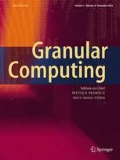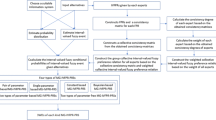Abstract
This paper investigates the decision-theoretic rough set (DTRS) approach in the frameworks of multi-granulation fuzzy and bipolar-valued fuzzy (BVF) probabilistic approximation spaces, respectively. By integrating fuzzy probability and BVF probability into the Bayesian decision procedure, we get four types of model of multi-granulation fuzzy decision-theoretic rough set (MG-FDTRS) approach and multi-granulation bipolar-valued fuzzy decision-theoretic rough set (MG-BVF-DTRS) approach. Our four types of model of the MG-FDTRS and the MG-BVF-DTRS approaches are mainly based on computation of the four different conditional probabilities within the frameworks of multi-granulation fuzzy and BVF probabilistic approximation spaces, respectively. The main contribution of this paper is twofold. One is to extend the fuzzy decision-theoretic rough set (FDTRS) approach to the MG-FDTRS and the MG-BVF-DTRS approaches. Another is to address its applicable ability as it is applied to deal with the multi-source fuzzy and BVF probabilistic decision systems. An example is included to show the feasibility and potential results obtained.




Similar content being viewed by others
References
Atanassov KT (1986) Intuitionistic fuzzy sets. Fuzzy Sets Syst 20:87–96
Bustince H, Barrenechea E, Pagola M, Fernandez J, Xu Z, Bedregal B, Montero J, Hagras H, Herrera F, Baets BD (2016) A historical account of types of fuzzy sets and their relationships. IEEE Trans Fuzzy Syst 24(1):179–194
Cacioppo JT, Gardner WL, Berntson GG (1997) Beyond bipolar conceptualizations and measure: the case attitudes and evaluation space. Personal Soc Psychol Rev 1:3–25
Chen DG, Zhang L, Zhao SY, Hu QH, Zhu PF (2012a) A novel algorithm for finding reducts with fuzzy rough sets. IEEE Trans Fuzzy Syst 20(2):385–389
Chen SM, Chang CH (2015) A novel similarity measure between Atanassovs intuitionistic fuzzy sets based on transformation techniques with applications to pattern recognition. Inf Sci 291:96–144
Chen SM, Chen CD (2011) Handling forecasting problems based on high-order fuzzy logical relationships. Expert Syst Appl 38(4):3857–3864
Chen SM, Hsiao WH (2000) Bidirectional approximate reasoning for rule-based systems using interval-valued fuzzy sets. Fuzzy Sets Syst 113(2):185–203
Chen SM, Tanuwijaya K (2011) Fuzzy forecasting based on high-order fuzzy logical relationships and automatic clustering techniques. Expert Syst Appl 38(12):15,425–15,437
Chen SM, Hsiao WH, Jong WT (1997) Bidirectional approximate reasoning based on interval-valued fuzzy sets. Fuzzy Sets Syst 91(3):339–353
Chen SM, Wang NY, Pan JS (2009) Forecasting enrollments using automatic clustering techniques and fuzzy logical relationships. Expert Syst Appl 36(8):11,070–11,076
Chen SM, Munif A, Chen GS, Liu HC, Kuo BC (2012b) Fuzzy risk analysis based on ranking generalized fuzzy numbers with different left heights and right heights. Expert Syst Appl 39(7):6320–6334
DAniello G, Gaeta A, Loia V, Orciuoli F (2017) A granular computing framework for approximate reasoning in situation awareness. Granul Comput 2(3):141–158
Deng X, Yao Y (2014) Decision-theoretic three-way approximations of fuzzy sets. Inf Sci 279:702–715
Dou H, Yang X, Song X, Yu H, Wu W, Yang J (2016) Decision-theoretic rough set: a multicost strategy. Knowl Based Syst 91:71–83
Dou HL, Yang XB, Fan JY, Xu SP (2012) The models of variable precision multi-granulation rough sets, RSKT 2012. LNCS 7414:465–473
Dubois D, Prade H (1990) Rough fuzzy sets and fuzzy rough sets. Int J Gen Syst 17:191–209
Dubois D, Prade H (2008) An introduction to bipolar representations of information and preference. Int J Intell Syst 23:866–877
Feng T, Mi J (2016) Variable precision multi-granulation decision-theoretic fuzzy rough sets. Knowl Based Syst 91:93–101
Fujita H, Gaeta A, Loia V, Orciuoli F (2018) Resilience analysis of critical infrastructures: a cognitive approach based on granular computing. IEEE Trans Cybern. https://doi.org/10.1109/TCYB.2018.2815178
Gau WL, Tan JM (1993) Vague sets. IEEE Trans Syst Man Cybern 23:610–614
Han Y, Shi P, Chen S (2015) Bipolar-valued rough fuzzy set and its applications to decision information systems. IEEE Trans Fuzzy Syst 33(6):2358–2370
Lee K (2004) Comparison of interval-valued fuzzy sets, intuitionistic fuzzy sets and bipolar-valued fuzzy sets. J Korean Inst Intell Syst 14(2):125–129
Lee LW, Chen SM (2015) Fuzzy decision making based on likelihood-based comparison relations of hesitant fuzzy linguistic term sets and hesitant fuzzy linguistic operators. Inf Sci 294:513–529
Liang DC, Liu D, Pedrycz W, Hu P (2013) Triangular fuzzy decision-theoretic rough sets. Int J Approx Reason 54:1087–1106
Lin G, Liang J, Qian Y, Li J (2010) A fuzzy multigranulation decision-theoretic approach to multi-source fuzzy information systems. Knowl Based Syst 91:102–113
Lin GP, Qian YH, Li JJ (2012) NMGRS: neighborhood-based multi-granulation rough sets. Int J Approx Reason 53(7):1080–1093
Lin GP, Liang JY, Qian YH (2013) Multi-granulation rough sets: from partition to covering. Inf Sci 241:101–118
Lin YJ, Li JJ, Lin PR, Lin GP, Chen JK (2014) Feature selection via neighborhood multi-granulation fusion. Knowl Based Syst 67:162–168
Loia V, DAniello G, Gaeta A, Orciuoli F (2016) Enforcing situation awareness with granular computing: a systematic overview and new perspectives. Granul Comput 1(2):127–143
Mandal P, Ranadive AS (2017) Multi-granulation bipolar-valued fuzzy probabilistic rough sets and their corresponding three-way decisions over two universes. Soft Comput. https://doi.org/10.1007/s00500-017-2765-6
Mandal P, Ranadive AS (2018) Multigranulation intervalvalued fuzzy probabilistic rough sets and their corresponding threeway decisions based on intervalvalued fuzzy preference relations. Granul Comput. https://doi.org/10.1007/s41066-018-0090-9
Pawlak Z (1982) Rough set. Int J Comput Inf Sci 11:341–356
Pedrycz W (2017) Granular computting: analysis and design of intelligent systems. CRC Press, Taylor & Francis Group, Boca Raton
Pedrycz W, Chen SM (2011) Granular computing and intelligent systems: design with information granules of high order and high type. Springer, Heidelberg
Pedrycz W, Chen SM (2015a) Granular computing and decision-making: interactive and iterative approaches. Springer, Heidelberg
Pedrycz W, Chen SM (2015b) Information granularity, big data, and computational intelligence. Springer, Heidelberg
Qian YH, Liang JY, Dang CY (2010a) Incomplete multi-granulation rough set. IEEE Trans Syst Man Cybern Part A 40:420–431
Qian YH, Liang JY, Yao YY, Dang CY (2010b) Positive approximation: an accelerator for attribute reduction in rough set theory. Artif Intell 174:597–618
Qian YH, Liang JY, Yao YY, Dang CY (2010c) MGRS: a multi-granulation rough set. Inf Sci 180:949–970
Qian YH, Liang JY, Pedrycz W, Dang CY (2011) An efficient accelerator for attribute reduction from incomplete data in rough set framework. Pattern Recognit 44:1658–1670
Qian YH, Zhang H, Sang YL, Liang JY (2014) Multigranulation decision-theoretic rough sets. Int J Approx Reason 55:225–237
Sun B, Ma W, Zhao H (2014) Decision-theoretic rough fuzzy set model and application. Inf Sci 283:180–196
Sun B, Ma W, Chen X (2015) Fuzzy rough set on probabilistic approximation space over two universes and its application to emergency decision-making. Expert Syst 32:507–521
Tree GD, Zadrony S, Bronselaer AJ (2010) Handling bipolarity in elementary queries to possibilistic databases. IEEE Trans Fuzzy Syst 18(3):599–612
Valverde L (1985) On the structure of f-indistinguishability operators. Fuzzy Sets Syst 17:313–328
Wang HY, Chen SM (2008) Evaluating students’ answerscripts using fuzzy numbers associated with degrees of confidence. IEEE Trans Fuzzy Syst 16(2):403–415
Yang H, Liao X, Wang S, Wang J (2013) Fuzzy probabilistic rough set model on two universes and its applications. Int J Approx Reason 54:1410–1420
Yang XB, Qi Y, Yu HL, Song XN, Yang JY (2014) Updating multi-granulation rough approximations with increasing of granular structures. Knowl Based Syst 64:59–69
Yao Y (2001) Information granulation and rough set approximation. Int J Intell Syst 16:87–104
Yao Y (2004) Information granulation an approximation in a decision-theoretical model of rough sets. In: Pal SK, Polkowski L, Skowron A (eds) Rough-Neural Computing. Cognitive Technologies, Springer, Berlin, pp 491–516
Yao Y (2008) Probabilistic rough set approximations. Int J Approx Reason 49:255–271
Yao Y (2010) Three-way decisions with prababilistic rough sets. Inf Sci 180:341–353
Yao Y (2011) The superiority of three-way decisions in probabilistic rough set models. Inf Sci 181:1080–1096
Yao Y, She Y (2016) Rough set models in multi-granulation spaces. Inf Sci 327:40–56
Yao YY (2007) Decision-theoretic rough set models. Lect Notes Comput Sci 4481:1–12
Yao YY, Wong SKW (1992) A decision-theoretic framework for approximating concepts. Int J Man Mach Stud 37:793–809
Yao YY, Wong SKW, Lingras P (1990) A decision-theoretic rough set model. In: Ras ZW, Zemankova M, Emrich ML (eds) Methodologies for intelligent system. North-Holland, New York, pp 17–24
Zadeh LA (1965) Fuzzy sets. Inf Control 8(3):338–353
Zadeh LA (1968) Probability measure of fuzzy events. J Math Anal Appl 23:421–427
Zadeh LA (1975) The concept of a linguistic variable and its application to approximate reasoning. Inf Sci 8:199–249
Zadeh LA (1979) Fuzzy sets and information granularity. In: Gupta N, Ragade R, Yager R (eds) Advances in fuzzy set theory and applications. North-Holland, Amsterdam, pp 3–18
Zhan-ao X, Nan W, Xiao-meng S, Tai-long Z (2016) Research on multi-granularity rough intuitionistic fuzzy cut sets. J Henan Normal Univ 44(5):131–139
Zhan-ao X, Xiao-meng S, Tian-yu X, Xian-wei X, Yilin Y (2017) Multi-granulation covering rough intuitionistic fuzzy sets. J Intell Fuzzy Syst 32:899–911
Zhang WR (1994) Bipolar fuzzy sets and relations: a computational framework for cognitive modeling and multiagent decision analysis. In: Proceeding of IEEE conference, pp 305–309
Zhang WR (1998) Yin Yang Bipolar fuzzy sets. In: Proceeding of IEEE world congress on computational intelligence-fuzzy-IEEE, Anchorange, pp 835–840
Zhang WR (2011) Yin Yang bipolar relativity: a unifying theory of nature, agents and causality with application in quantum computing, cognitive informatics and life sciences. IGI Global, Hersgey, New York
Zhang WR, Zhang L (2004) Yin Yang bipolar logic and bipolar fuzzy logic. Inf Sci 165(3–4):265–287
Zhao SY, Tsang CC, Chen DG (2009) The model of fuzzy variable precision rough sets. IEEE Trans Fuzzy Syst 17(2):451–467
Zhao SY, Tsang CC, Chen DG, Wang XZ (2010) Building a rule-based classifier by using fuzzy rough set technique. IEEE Trans Knowl Data Eng 22(5):624–638
Zhao SY, Chen H, Li CP, Zhai MY (2013) RFRR: robust fuzzy rough reduction. IEEE Trans Fuzzy Syst 21(5):825–841
Zhao XR, Hu BQ (2015) Fuzzy and interval-valued fuzzy decision-theoretic rough set approaches based on fuzzy probability measure. Inf Sci 298:534–554
Zhao XR, Hu BQ (2016) Fuzzy probabilistic rough sets and their corresponding three-way decisions. Knowl Based Syst 91:126–142
Acknowledgements
The authors would like to thank the Editor in Chief and reviewers for their thoughtful comments and valuable suggestions.
Author information
Authors and Affiliations
Corresponding author
Ethics declarations
Conflict of interest
Prasenjit Mandal and A. S. Ranadive declare that there is no conflict of interest.
Ethical approval
This article does not contain any study performed on humans or animals by the authors.
Informed consent
Informed consent was obtained from all individual participants included in the study.
Additional information
Publisher's Note
Springer Nature remains neutral with regard to jurisdictional claims in published maps and institutional affiliations.
Rights and permissions
About this article
Cite this article
Mandal, P., Ranadive, A.S. Multi-granulation fuzzy decision-theoretic rough sets and bipolar-valued fuzzy decision-theoretic rough sets and their applications. Granul. Comput. 4, 483–509 (2019). https://doi.org/10.1007/s41066-018-0111-8
Received:
Accepted:
Published:
Issue Date:
DOI: https://doi.org/10.1007/s41066-018-0111-8




